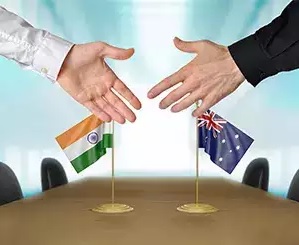Given the number of students seeking qualifications from most sought-after countries, mutual recognition of qualifications will be a big game changer

During his maiden four-day India visit, Australia’s Prime Minister Anthony Albanese announced the Mutual Recognition of Educational Qualifications (MREQ) with India and Australia. This means that both these nations will now recognise each other’s education degrees in a landmark development that opens vast commercial opportunities for education service providers.
After being elected as PM in May 2022, Australia's Prime Minister Anthony Albanese visited India to take bilateral ties to the next level. The agreement for mutual recognition was signed following a bilateral meeting between Union Education Minister Dharmendra Pradhan and his Australian counterpart Jason Clare on a visit to India. The above agreement is part of the commitment by the Prime Ministers of both countries at the 2nd India-Australia Virtual Summit, wherein they had agreed to establish a Joint Taskforce for mutual recognition of qualifications.
Understanding the need to create more opportunities for two-way mobility of students and professionals for education and employment, India signed a treaty of mutual recognition of qualifications with the UK to officially recognise each other’s academic degrees and high educational qualifications. This recognition of Indian and Australian educational degrees is India's most comprehensive and ambitious arrangement with any country, given that education is Australia’s largest service export to India, valued at $4.2 billion in 2021. India is the second largest source of international students, besides accounting for the largest pool of skilled migrants to Australia. The Australian 2021 Census recorded 976,000 people with Indian heritage, of which 673,000 were Indian-born Australians, making a sizeable 2.6%.
Mutually recognising academic qualifications is believed to help ease students’ and aid professionals' mobility. This mechanism would ensure that Indian students attaining a degree from an Australian university would have it recognised should they wish to continue their studies in India. This also paves the way for commercial opportunities for Australian education providers to offer more innovative and accessible education to Indian students and provides a solid basis for educational institutions to consider new ways to partner.
A task force comprising senior officials of education and skill ministries and regulators on both sides developed a comprehensive mechanism covering education and skill qualifications. This initiative will help ease the mobility of students and professionals between the two countries. It will help facilitate the two-way mobility of young people for education and employment purposes by mutually recognising various levels of education and skill qualifications. While the two countries will recognise the degrees, professional registrations of engineering, medicine and law pass-outs will remain outside the framework's ambit.
Over the past few years, the number of Indian students choosing to study and live in the UK has increased consistently yearly and will enable more Indians to apply to study and live in the UK. With more than 120,000 Indian students studying in the UK in 2021-2022, Indian students make up among the most significant international student communities in the UK. The UK saw a 50% YoY increase in Indian students studying there in 2021-22, per the Higher Education Statistics Agency (HESA) data.
The EU has already started recognising degrees issued in the territories of all its countries and has made significant progress regards automatic mutual recognition of higher and upper secondary education qualifications and the periods of learning abroad.
The EU countries like Germany, Denmark, Finland, France, Malta, Poland, Romania and Sweden already have an automatic mutual qualification recognition for all EU countries embedded in their national legislation. This arrangement would further facilitate the mobility of students and apprentices across the EU. The other four nations, Austria, Croatia, Italy and Spain, joined the initiative, while the Czech Republic, Greece, and Slovakia are in the process. Greece is the one EU country lagging behind the others regarding the mutual and automatic recognition of diplomas issued in the rest of the EU.
India has also tied up with the UAE under the India-UAE comprehensive free trade agreement (FTA) to facilitate mutual recognition of professional degrees in sectors such as architecture, engineering, medicine, nursing, accountancy, and company secretaries, allowing more effortless mobility of skilled services professionals across the two countries. At the same time, the French Ministry of Higher Education has mutually recognised educational qualifications acquired in India regarding the Baccalaureate equivalent SSCE and the License equivalent to a bachelor’s in India. This arrangement will go a long way for the French universities to meet the target of having 20,000 Indian students at their campuses.
In another significant development, the Union Cabinet of India has approved the signing of the MoU between the Institute of Chartered Accountants of India (ICAI) and The Institute of Chartered Accountants in England & Wales (ICAEW). This recognition of the qualification and training of each other’s members as the first in the Post-Brexit era will allow mutual admission of the members from both institutions in good standing by prescribing a bridging mechanism on the general terms and conditions. This mutual recognition of ICAI with ICAEW will bring many professional opportunities for Indian CAs in the UK and for Indian CAs who are looking for global professional opportunities in the UK.
India has set the target of providing 50 per cent of its youth with either higher education or skill education by 2035. India has the world’s second-largest schooling system, with over 1.5 million schools and nearly 250 million enrolments. India’s higher education system has the third largest enrolment after China and the United States, and the number of Indian overseas students has steadily increased. A six-year peak was recorded in 2022 at 750,365 students.
Given the high number of students desiring to get qualifications from the most sought-after countries, the mutual recognition of qualifications will undoubtedly be a big game changer.